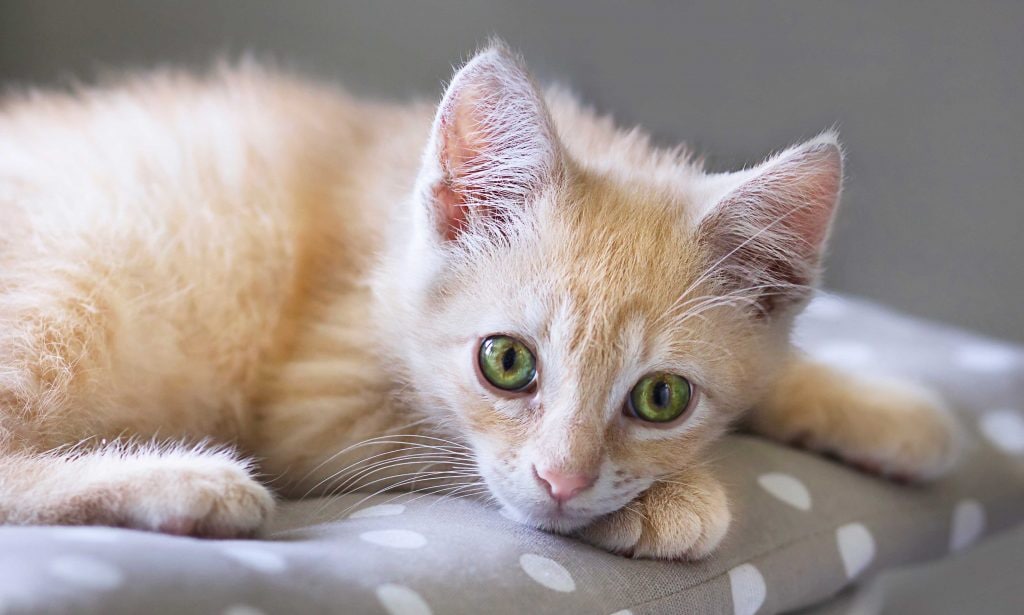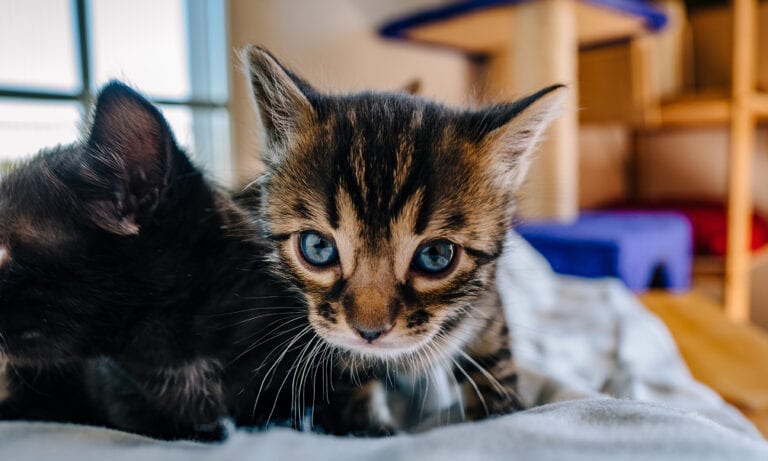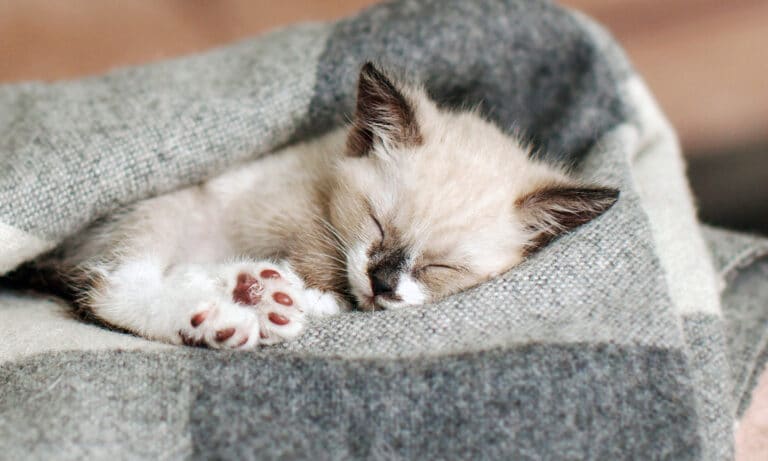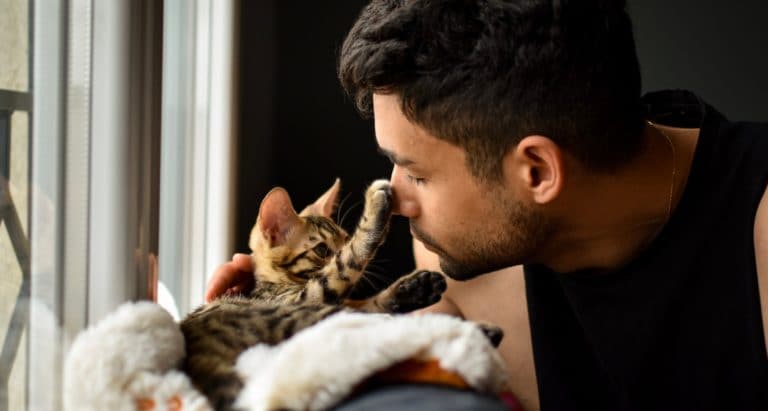Kittens are undeniably adorable, stealing our hearts with their tiny paws and heart-melting meows. But even these little bundles of cuteness can't make everything charming—especially when it comes to diarrhea.
Kitten diarrhea can be triggered by various factors, but most commonly they include eating or drinking something they shouldn’t have, a sudden change in diet, viral or bacterial infections, and parasites.
Recognizing the symptoms of kitten diarrhea and providing timely and appropriate treatment can help alleviate your kitten's discomfort and safeguard their health. We spoke with a vet expert about how to navigate this stinky situation with confidence.
In This Guide:
Is It Normal for Kittens To Have Diarrhea?
Just like their human counterparts, kittens may experience diarrhea from time to time. However, this doesn't mean that you should ignore it or consider it normal.
When a kitten has diarrhea, it means something in their system is amiss. The key is finding out what that is and determining the best treatment (if any).
So, what are the possible causes of kitten diarrhea? Let’s find out.
Causes of Kitten Diarrhea
Kitten diarrhea can stem from a variety of causes, ranging from relatively benign to more serious. Understanding the potential triggers can help you identify and address the issue more effectively.
Common causes of diarrhea in kittens include:
Dietary Causes
- Drinking cow’s milk: Although kittens do have the enzyme needed to digest lactose prior to weaning, cow's milk is not properly balanced for kittens and can cause tummy issues. If a kitten doesn't have a mom to nurse from, they should be fed kitten milk replacer rather than cow's milk.
- Abrupt new diet: Introducing a new type of food to your kitten too quickly can lead to an upset stomach and diarrhea. Always transition your kitten to a new diet gradually over seven to 10 days.
- Food allergies: Kittens can have food allergies or intolerances, which may cause gastrointestinal issues and bouts of diarrhea.
Parasites
Parasitic infections such as roundworms, hookworms, tapeworms, giardia, and coccidia can cause diarrhea in kittens.
Infections
Several bacterial and viral infections can lead to diarrhea in kittens, including:
- Feline panleukopenia: Also known as feline distemper and feline parvo, this highly contagious viral infection can cause severe diarrhea, vomiting and dehydration.
- Feline coronavirus (not the same as COVID-19): This viral infection is generally asymptomatic but can cause mild diarrhea.
- Feline immunodeficiency virus (FIV): Although not a direct cause of diarrhea, FIV can weaken a kitten's immune system, making them more susceptible to infections that cause gastrointestinal
- Feline leukemia virus (FeLV): Similar to FIV, FeLV can compromise a kitten's immune system, increasing their risk of developing diarrhea-inducing infections.
- Rotavirus: This viral infection primarily affects young kittens and can cause diarrhea, vomiting and dehydration.
- Escherichia coli: Though the presence of E. coli is normal in the gastrointestinal tract of cats, specific types of E. coli can cause diarrhea. Feeding raw meat, for example, could increase risk. Kittens can also get infected living in a crowded, dirty environment.
Environmental Stress
Kittens are sensitive to changes in their environment, and stress can result in diarrhea. Moving to a new home, meeting new people or the presence of other pets are all potential triggers.
Also, remember that your kitten cannot control the diarrhea, so please don’t scold them for the accidents. They cannot help it, and adding stress may only make their diarrhea worse.
Inflammatory Bowel Disease
Inflammatory bowel disease (IBD) is a chronic condition characterized by inflammation of the gastrointestinal tract. It can disrupt your kitten's digestive system and lead to persistent diarrhea. This condition is not common in kittens or young cats, mostly affecting middle-aged to older cats.
Kitten Diarrhea Signs and Symptoms
Frequent, urgent pooping of loose, watery stools is the classic presentation of kitten diarrhea, but straining to poop can also be a sign.
Other signs and symptoms that may accompany diarrhea include:
- Fever
- Lethargy
- Malaise
- Loss of appetite
- Vomiting
- Inflammation of the perineal skin
- Fecal staining of the hind legs and/or tail
- Weight loss
- Dehydration (kittens have an increased risk of becoming dehydrated from even a single episode of diarrhea)
It’s easy to determine if an indoor kitten is having diarrhea—just check your kitten’s litter box. If you allow your kitten to go outside (which is not recommended for safety reasons), diagnosis is more difficult—you’d have to observe your kitten as they do their business or find their poop after the fact.
If you do find loose, watery poop either indoors or outdoors and it persists, take a sample to your veterinarian for analysis.
Kitten Poop Color: What’s Normal?
A healthy kitten's poop should be brown, ranging from a light to a darker shade. The consistency should be firm but not too hard, similar to that of Play-Doh.
Here are some abnormal colors you might encounter and what they may indicate:
- Red: Red blood in the stool usually indicates a problem with the lower intestine/colon or rectum.
- Black: Black blood in the stool usually indicates a more serious problem higher up in the digestive tract.
- Green: Unless your kitten has recently eaten grass, green stool is not normal and could be an indicator of liver disease.
- Brown with white flecks: If your kitten’s stool contains flecks of white, they likely have intestinal worms.
How Long Does Kitten Diarrhea Last?
- For minor causes such as dietary changes or mild environmental stress, diarrhea might resolve on its own within 24 to 48 hours.
- If the diarrhea is due to more severe issues like infections, parasites or chronic gastrointestinal conditions, it may last for a more extended period (several days, weeks or even months).
Ultimately, how long diarrhea lasts depends on the condition, the severity of the condition and the effectiveness of the treatment.
When Do I Need To See a Veterinarian?
Other signs and scenarios that point to more serious issues and require a prompt visit to your veterinarian or pet emergency include:
- Your kitten’s poop is red or black
- Your kitten is straining to poop
- You suspect your kitten may have eaten something toxic or poisonous
- You notice signs of dehydration, such as dry mucous membranes, sunken eyes and decreased skin elasticity
- Your kitten has ongoing diarrhea and has not received all their vaccinations
- Your kitten appears to be in pain or discomfort
- Your kitten is also vomiting
- Your kitten has a fever (after taking their temperature)
- You notice signs of debilitation, such as falling down or not being able to walk properly
Kitten Diarrhea Treatment
So, how do you go about getting your kitten's tummy back on track? Let’s explore the two components of kitten diarrhea treatment: at-home care and veterinary treatment.
At-Home Treatment Options
If you’ve checked in with your veterinarian and determined it’s okay to take a wait-and-see approach with your kitten’s diarrhea, there are a few things you can try at home to help alleviate their discomfort and potentially resolve the issue.
Changing Food
If your kitten is otherwise healthy and their behavior is normal, ask your veterinarian if you should withhold food (food only, not water) for 12 hours.
After 12 hours of withholding food, offer your kitten a bland, easily digestible food that is fat-free. Make sure to get the food you plan to offer approved by your veterinarian.
Some good options are:
- Prescription gastrointestinal food for kittens
- Boiled chicken or ground turkey with no oils or seasonings
- Canned pure pumpkin
- Cooked sweet potato with no seasonings
How to serve: Try mixing equal parts cooked turkey (boiled and drained of fat) and pumpkin and giving your kitten smaller portions frequently throughout the day until the diarrhea resolves. If the diarrhea does not resolve in the first two to three days on a bland diet, check back in with your vet.
For some cases of diarrhea, it may be necessary to modify your kitten’s diet permanently. You may need to give your kitten special cat food that avoids certain ingredients. Special foods may serve to add fiber, decrease fat intake and increase digestibility.
Natural Remedies
If you’re interested in exploring natural remedy options for your kitten, consult with your veterinarian. They will help guide you to the best options based on your kitten’s age and health or refer you to a holistic vet.
Hydration
Because kittens are more prone to dehydration, a kitten with diarrhea needs to take in more water by whatever means possible. If your kitten is dehydrated, it is best to seek veterinary attention.
Pedialyte® is an over-the-counter electrolyte beverage designed for infants and children and can be added to your kitten’s water. Begin by offering water that includes 10% Pedialyte (original, clear and unflavored). If your kitten drinks it, increase the amount of Pedialyte to 50%. Make sure to get Pedialyte usage approved by your veterinarian.
Veterinary Diagnosis and Treatment
Bring your kitten to your veterinarian if their diarrhea continues for more than a day, or if you observe any of the above-mentioned symptoms.
Your veterinarian will examine your kitten for underlying illnesses and most likely take a stool sample to check for the presence of internal parasites, overgrowth of bacteria or other fecal abnormalities. Your veterinarian may also conduct blood work or other diagnostic tests, such as X-rays, ultrasound, cultures, endoscopy, and biopsy.
If your kitten is dehydrated, the veterinarian may give them supplemental fluids via an intravenous (into a vein) or subcutaneous (under the skin) route.
The treatment your kitten receives will depend on the suspected underlying cause of the diarrhea. For example:
- Dietary related: If your veterinarian suspects your kitten’s diarrhea is related to their food, they’ll suggest an alternative food. If the diarrhea is occurring because food was changed too quickly, they may prescribe antidiarrheal medications to help your cat get back to normal. They may also recommend a bland gastrointestinal diet with a slow transition back to normal food.
- Parasites: If intestinal parasites are present, your veterinarian will prescribe the appropriate dewormer and/or other medication. Not all dewormers kill every kind of parasite, so the exact type of parasite(s) must be identified, and the appropriate anti-parasitic medication(s) selected. In many cases, deworming must be repeated one or more times over a few weeks or more. Keep things clean to remove the worm eggs from your home.
- Bacteria: If it’s determined your kitten has a bacterial infection, your veterinarian will prescribe the appropriate antibiotic(s). Antibiotics may also be given if the intestine has been damaged.
- Viral: Currently, there are no treatments to stop viral infections. Rather, treatment focuses on offering supportive care. In this case, your veterinarian may prescribe an anti-diarrheal drug, which will make your kitten’s stools more well-formed.
Kitten Diarrhea Prevention
Prevention is always better than cure, and taking proactive steps to minimize the risk of kitten diarrhea can ensure the well-being of your fur baby.
Some strategies to help keep your kitten's digestive system healthy and reduce the likelihood of diarrhea include:
- Regular veterinary check-ups: Regular deworming, parasite control and vaccinations are essential for maintaining your kitten's health and reducing the risk of diarrhea. Consult your veterinarian for an appropriate deworming schedule, flea/tick prevention methods, and vaccination guidelines based on your kitten's age and risk factors. These preventive healthcare measures can help eliminate common parasites and protect against viral infections that can cause diarrhea.
- Proper nutrition: Provide a high-quality, age-appropriate diet for your kitten, and avoid abrupt changes to a new food. Consult your veterinarian for guidance on the best diet for your kitten's specific needs.
- Good hygiene: Maintain a clean living environment for your kitten, including regular litter box cleaning, to minimize the risk of infections and parasites.
- Stress reduction: Minimize stress by providing a comfortable, safe and stable environment for your kitten. Introduce new experiences, people and other pets gradually to avoid overwhelming your kitten and causing stress-induced diarrhea.
- Avoidance of cow’s milk: Refrain from giving your kitten cow's milk, as many kittens lack the enzyme required to digest lactose, which can result in diarrhea.
- Keep your kitten indoors: Kittens who spend time outdoors are at an increased risk for internal parasites, contracting viral diseases from other cats, or ingestion of inappropriate food or plants, which could lead to diarrhea.
Caring for a kitten with diarrhea might be a messy affair, but with knowledge, vigilance and lots of love, you'll have your fluffy companion back to their playful, purring self in no time!
Keep in mind, diarrhea isn't just a kitten issue. Explore our articles on adult cat diarrhea and senior cat diarrhea so you can continue to safeguard your feline companion’s health, cleanliness, and well-being throughout their entire life.
Expert input provided by Byron de la Navarre, DVM, Chief of Staff at Animal House of Chicago.
This content was medically reviewed by a veterinarian.
More about caring for your kitten:
Share:










